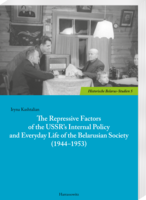|
|
more titles of the subject:
Download:
Please note: With adding digital Products to your cart
the payment will be handled via PayPal. The download will be provided after the payment is confirmed. Iryna Kashtalian examines forms of repressive factors and the impact they had on the daily life of the Belarusian society between 1944 and 1953. The research was based on relevant archives and eyewitness reports.
The repressive factors of the USSR’s internal policy noticeably influenced main aspects of daily life, particularly in West Belarus, which was still in the course of submitting to the Soviet system into which the rest of BSSR territory had already been integrated. The threat of repressions made the majority of BSSR inhabitants choose conformism as a strategy of survival. However, despite the continuous threat of violence and the difficult conditions of postwar restoration, the search for possibilities to maintain close social networks was a determining factor in everyday life. Fighting for this goal obliged people to use both legal and illegal means. Due to the scope for decision-making they occasionally had, local functionaries could determine the extent of the repressive measures without losing sight of the actual aims. Yet, this strongly depended on the individual circumstances and on the respective functionary’s personality. |
|||||||||||||||||||||||||||||||||||||||






